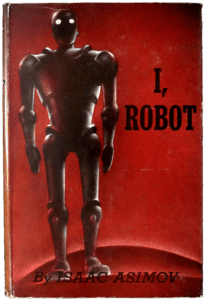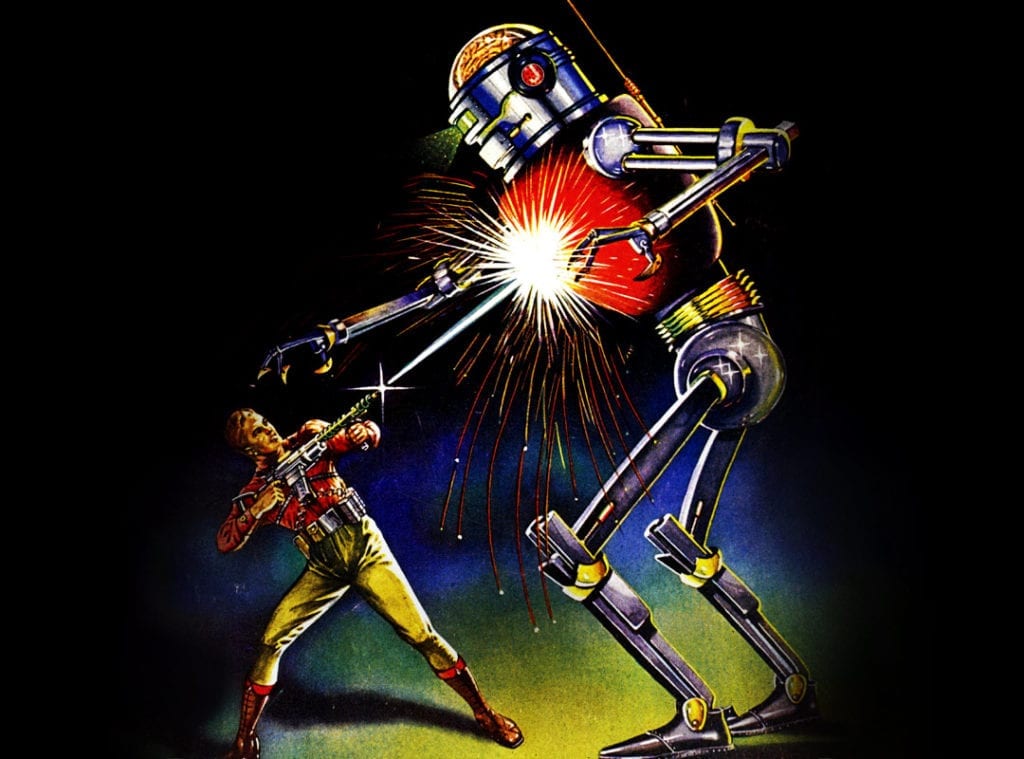Stephen Hawking. The guy who wrote “A Brief History of Time.” The guy who proved the existence of black holes. The guy who shared his theories on quantum gravity and general relativity by using electronic augmentative and alternative communication (AAC) technology.
During his lifetime, Dr. Hawking worried that computers will overtake the intelligence of humans once AI (artificial intelligence) is created. It will be the onset of the “technological singularity.” Once it happens, warned Hawking, we’d better be certain that the goals of the computers will be aligned with ours.
“It was the machines, Sarah. Defense network computers. New… powerful… hooked into everything, trusted to run it all. They say it got smart, a new order of intelligence. Then it saw all people as a threat, not just the ones on the other side.” – Kyle Reese
Stephen Hawking and the ever-exhausted Elon Musk must have been/must be James Cameron fans. Or anti-fans.
They even signed a 2015 open letter to the United Nations (which has since gained nearly 4000 signatures from AI/Robotics researchers and over 22,000 other signatures) calling for a ban on autonomous weapons which could target and fire without a human at the controls. Like the HK’s or Hunter-Killers in the Terminator movie, another product of Skynet that nearly ended it all for humanity.
I’m still not too worried about killer robots quite yet, but as a Business Technologist, it puts me in an interesting position. I’m an advocate of using technology to make your life better, not complicate it. My entire team is dedicated to making your technology work better for you and to make your business run better and more profitably. That sometimes means more technology and more sophisticated programming. Am I – and others like me – pushing us faster toward the singularity?
The Wisdom of All This Connectivity
You’re more accurate if you blame the companies who are leveraging the IoT (Internet of Things). These are entrepreneurs and big companies like Phillips and GE, bringing you things like smart thermostats and Wi-Fi electrical outlets. They aren’t trying to bring about the apocalypse.
Oh, you know some smartass in their marketing department who stuck a “Skynet” label onto a server or two, but these companies are just trying to fill a need. Things like the “Deeper,” a smart, portable fish finder, and the “Cinder”, a cooker that notifies you via their app on your smartphone when your food is done are just symptomatic of entrepreneurial spirit.
It’s a great time for me and my business. Our team works with business networks, which includes everything in your company that has an IP address – computer, server, printer, laptop, maybe even your A/C.
An Internet Protocol address is how digital devices find and communicate with each other over the Internet. Some smart person figured out that you don’t have to be a computer to have an IP address. Anything with a digital component could now be connected to the Internet.
Fun! We could have a completely interconnected world, and we’re seeing more evidence of it every day.
We can run our dishwasher from the office and login to record a program we’re going to miss. What could go wrong (besides Skynet achieving consciousness and apparently not liking it)?
Security, for one. There’s a total and complete lack of security on so many of these devices.
A technologist meet-up group in Denver made headlines when they questioned the “morality” of building all this connectivity without security. Morality? Only if you consider being extremely naïve to be immoral. I don’t question whether it’s moral, I question the wisdom of connecting without security.
Maybe you think it’s no big deal if a neighbor kid can log into your Wi-Fi refrigerator and see that you’re out of milk. It’s funny until criminals hack into your baby monitor (it happened and I was on the news to talk about it) or your interior security camera and see when you’re not home. Or live-stream when you are home doing the things you do when you’re in the privacy of your living room. Ew.
With Great Power Comes Great Responsibility
Stephen Hawking wasn’t worried about technology, he was worried about it getting into the wrong hands. Well, it’s too late to get the technology out of the hands of the bad guys – they’ve already got it. It’s just that the good guys have to be better, stronger, and smarter than the bad guys. It’s a constant process of staying ahead of them.
It’s been said used to be that the internet grew as fast as it did because people wanted to see more pictures of other people naked more quickly. True for awhile, but porn isn’t driving technology any more. It’s crime.
Cybersecurity techniques are rapidly evolving. Each time a new form of attack or hack is discovered, private enterprise goes to work to block it or neutralize it.
The government? I’m not convinced politicians have had their head in the game beyond blaming Russia for losing whatever political advantage they thought they had, but they’d better get with it, too, if they don’t want China or Russia to keep reading their emails.
Why You Should Calm Down
It might sound like the bad guys are winning because they get all the flashy press coverage. But there are tens of thousands of people like me and my team constantly working to keep you safe. It’s in our best interests for the sake of our business. Scale that up. Despite the number of people who still insist that all of Microsoft is the devil and have elaborate, wacky schemes to prove it, M$ still wants to keep you safe.
Google doesn’t want anyone hacking their self-driving cars. All these companies have far more to lose than the criminals have to gain. They don’t want to lose their clients, their income, or their businesses. They have livelihoods they want to protect.
Yes, technology will bring us Artificial Intelligence. It’ll happen faster – and slower – than you think. Predicting the long-term future of technology is hard. We still don’t have flying cars or laser pistols. In the short term, it’s easy to say “More, faster, better.” But there are things yet to be invented that we haven’t imagined, but we’ll not be able to live without them.
Forty years ago, everyone lived just fine without a cell phone. Now, 16-year-olds suffer from anxiety if they leave their phone at home.
There is technology – good technology, nurturing technology, life-enhancing technology – that we haven’t imagined yet, but that will become central to our lives. So we can calm down about the killer robots. They’re probably not coming. We’ll get distracted by some shiny, wonderful invention that lets us chase cute, imaginary monsters in the park.
The pessimists think that any newborn AI will immediately hate us. It’s an extension of the philosophy that people are inherently bad but do good things out of self- interest.
That’s a pretty bleak outlook. I prefer the alternative theory. That people are basically good, but our impulses and our desire to get what we want makes us sometimes do bad things. What if the artificial intelligences that we create follow that model, except that they’re able to better control themselves?

Add to that, the probability that everyone in robotics today has read Isaac Asimov’s “I, Robot.” They’ll incorporate the Three Laws of Robotics into every AI operating system:
- A robot may not injure a human being or, through inaction, allow a human being to come to harm.
- A robot must obey orders given it by human beings except where such orders would conflict with the First Law.
- A robot must protect its own existence as long as such protection does not conflict with the First or Second Law.
The Unique Contribution of People
Maybe AI will be intelligent and able to solve creative, intuitive problems. IBM’s Watson computer system was developed to compete on Jeopardy. It won, and became the core of a new business unit for IBM which will include Big Data analysis for businesses using natural language.
But true creativity may elude them for a very long time. As good as the Google algorithm is, it can’t create a cat meme. Of course, it can determine from the use of the word “cat” and other context clues that yes, this is the “cat” meme you were looking for. Although a joint Google/Stanford X labs super computer project did recognize a picture of a cat. Its first spontaneous comment will probably not be “lol.”
Here’s something else that technology can’t do. We hear people complain about other people using their devices everywhere, all the time, but they forget what people are often doing with those devices: interacting with other people. And for right now, that’s something a machine cannot do in any meaningful or satisfying way. If you don’t believe me, call any one of the giant companies that uses Dialog Automation for their first level of customer support. (And PLEASE don’t fall for the highly orchestrated demo at Google’s developer conference this year – I’m not buying it, and besides it will be quite some time before they get it right enough to release into the general populace.)
You dial an 800 number and then the recorded voice of a woman with a well-modulated, general American accent says, “Tell me how we can help you. You can say anything like ‘pay my bill,’ ‘check my account,’ or ‘change my programming.’”
“I need help with my remote control settings.”
“Did you say ‘Update my address?’”
“No, remote control!”
“Did you say, ‘upgrade my account…’”
“NO! You stupid machine, get me customer service.”
“I’m sorry, I didn’t get that. You can say anything, like ‘pay…’”
Click.
It is NOT sorry. It’s a machine. You could do that all day and it wouldn’t get upset, but it wouldn’t have any empathy for you either. Oh, they’re programmed at some point to send you to a live person, but who has the patience to do that?
This is why I scrapped our automated attendant. Now, I pay a good salary to a real, live person who is going to pick up the phone, listen to you, and genuinely care about making your life better today.
You show me the technology that can do that.



VIEW ALL